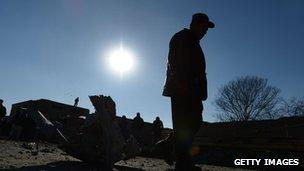Nato admits 'error' in claim of fall in Taliban attacks
- Published

US-led military forces in Afghanistan have admitted that an error led them to mistakenly claim a fall in the number of attacks by the Taliban last year.
A report posted on the website of the Nato-led Isaf force had claimed that there had been a 7% drop in Taliban attacks in 2012.
However, after being queried the figure was removed from the site.
The error is likely to embarrass Isaf which has been insisting the militants are in decline, correspondents say.
The Associated Press news agency reports that it inquired about the missing figures when they were taken down from Isaf's site without explanation.
Isaf spokeswoman Erin Stattel told the BBC that "during a quality control check, Isaf recently became aware that some data was incorrectly entered into the database that is used for tracking security-related incidents across Afghanistan.
"This was a record-keeping error that we recognised and have now corrected."
The correction shows no change in the number of attacks during the period concerned.
"In spite of this data adjustment, our assessment of the fundamentals of campaign progress has not changed," Ms Stattel went on. "The enemy is increasingly separated from the population and the ANSF [Afghan National Security Force] are currently in the lead for the vast majority of partnered operations."
US and Western officials have often pointed to decreasing violence in Afghanistan as a sign that Isaf's mission is meeting with success.
Earlier this month the outgoing commander of Nato forces in Afghanistan, Gen John Allen, insisted the alliance is on the road to winning the war.
But correspondents say the Taliban are a long way from being defeated. They still mount regular attacks with devastating effect and are in de facto control of many parts of the country.
Most foreign troops are due to leave Afghanistan by the end of 2014 and hand over responsibility for security to Afghan forces, but serious questions have been raised over whether they will have developed sufficient capability for the task.